In this week’s review of Court Judgments, we look at Supreme Court’s observation that ordinary law and order situation doesn’t call for the application of the Preventive Detention Act, SC’s displeasure at Posting Anticipatory Bail Plea after 2 Months, Allahabad HC’s directions that no Arrest or coercive action during the two months’ cooling-off period after FIR registration under section 498A of IPC, etc.
Supreme Court: Ordinary Law and Order situation doesn’t call for the application of the Preventive Detention Act
In Shaik Nazneen vs. The State of Telangana, the Supreme Court set aside the ruling of the division bench of the Telangana High Court that upheld the application of the Preventive Detention Act on the petitioner’s aide. The apex court held that normal law and order situations should be dealt with the ordinary law of the land and unnecessary invocation of the Preventive Detention Act is uncalled for.
The apex court was hearing an appeal petition filed by the petitioner against the preventive detention order upheld by the High Court on her husband. The petitioner’s husband was involved in a series of chain-snatching offences and was arrested multiple times. However, only four cases were considered as the ground for detention as the jurisdiction of other cases was different. These four cases were committed in a span of two months and the detenu obtained bail in all these cases under section 167(2) of the Code of Criminal Procedure, 1973 (CrPC).
The detention was enforced under Section 3(1) of ‘The Telangana Prevention of dangerous activities of boot-leggers, dacoits, drug-offenders, goondas, immoral traffic offenders, land-grabbers, spurious seed offenders, insecticide offenders, fertiliser offenders, food adulteration offenders, fake document offenders, scheduled commodities offenders, forest offenders, gaming offenders, sexual crime offenders, explosive substances offenders, arms offenders, cyber-crime offenders, and white collar or financial offenders act, 1986.’ As the offences committed by the detenu fell under chapter XVII of the IPC and since he was a habitual offender, the detenu was categorized as ‘goonda’ under Section 2 of the above act, hence inviting the applicability of preventive detention under the above-mentioned act.
The apex court held that maintenance of public order is vital under section 3(1) of the above act. However, the allegations and the progress of case history against the filed cases reveal that this is an ‘ordinary law and order’ problem and not a ‘public order’ problem. Additionally, the apex court held that the Preventive Detention Law gives the government extraordinary powers that can only be used in rare circumstances since they have a significant negative impact on an individual’s independence and liberty. As a result, they cannot be used regularly. Under the facts and circumstances of the case, seeking shelter under the preventive detention statute is not the appropriate course of action, the court held.
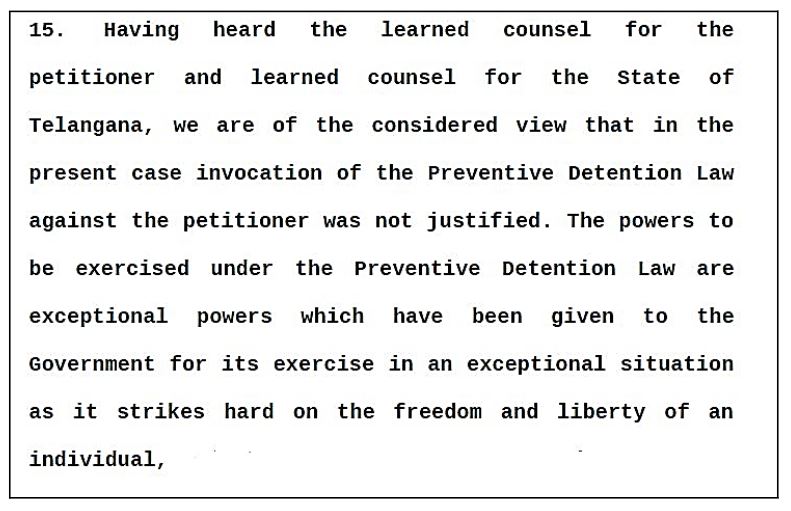
The court relied on Ram Manohar Lohia vs. State of Bihar, where the court distinguished between ‘public order’ and ‘ordinary law and order’. Additionally, the court highlighted the repeated and unjustified use of the Preventive Detention Law in the State of Telangana, as observed in the Mallada K. Sri Ram vs. The State of Telangana & Ors. Accordingly, the judgement of the High court is set aside.
Supreme Court: Posting Anticipatory Bail Plea after 2 Months Can’t Be Appreciated
The Supreme Court in Sanjay vs. The State (NCT of Delhi) & ANR, held that in matters involving personal liberty, the court is expected to pass orders at the earliest depending on the merits of the case.
The apex court was hearing a special leave petition to appeal (Criminal) against the judicial decision of the Delhi High Court, which posted the hearing of the anticipatory bail after two months without the grant of any interim protection. The bench of Justices C.T. Ravi Kumar and Sudhanshu Dhulia looked at the grievance of the petitioner in the filed SLP.
Accordingly, the bench affirmed that in matters relating to personal liberty, the courts must pass orders at the earliest based on the merits of the case and in accordance with the law. It further asserted that posting an anticipatory bail petition after a couple of months, at any rate, is not appreciated. It requested the Delhi High Court to consider the merits of the case and decide further. Till such time, the petitioner was provided with interim relief from arrest.

Supreme Court: ‘No Probability of Reformation, Danger to Society’, SC says while upholding the death penalty to a man for the rape and murder of an 8-year-old disabled girl.
In Manoj Pratap Singh vs. The State of Rajasthan, the apex court upheld the conviction and the sentence awarded to the appellants and dismissed the appeals accordingly.
The apex court was hearing an appeal against the decision of the High Court of Rajasthan. Initially, the trial court convicted the appellant and found no appropriate justification to adopt a lenient view for this gruesome crime and awarded punishments of varying nature, including the death penalty under section 302 of the Indian Penal Code. The High Court upheld the conviction and the sentence under section 366 of the Code of Criminal Procedure, 1973.
The trial court considered this as a ‘rarest of the rare’ case and held that the death sentence is the only justice in this case. When appealed against this decision in the Rajasthan High Court, it upheld the sentence and confirmed the death sentence. The counsel for the state in High Court relied on Kamta Tiwari vs. State of Madhya Pradesh, Machhi Singh and Others vs. State of Punjab, Vasanta Sampat Dupare vs. State of Maharashtra and Bachan Singh vs. State of Punjab for guidelines regarding the upholding of death sentences.
The apex court highlighted the judgement in the Bachan Singh vs. State of Punjab that upheld the constitutional validity of the death penalty. It does not violate any principles under the Indian Constitution, particularly Article 21 in both letter and spirit. Looking at all the evidence and the previous criminal jurisprudence, the apex court upheld the death sentence and noted that remission of the sentence does not appear to be justified.

Allahabad HC: No Arrest or coercive action during the two months’ cooling-off period after FIR registration, Allahabad High Court, while issuing safeguards against the misuse of Section 498A
In Mukesh Bansal vs. The State of Uttar Pradesh, the bench of Justice Rahul Chaturvedi was hearing a revision petition against the decision of the sessions court which rejected the discharge applications by the petitioners in an offence under section 498A of the IPC.
The wife of one of the petitioners filed an FIR against the husband and her in-laws for allegedly causing domestic violence by demanding additional dowry and solicitation of sexual favours including cruel acts of sex. The Additional Sessions Judge, Fast Track Court, Hapur had rejected the discharge petitions earlier.
The Hon’ble High Court while deciding on the matter made a slew of observations on the language of FIR.
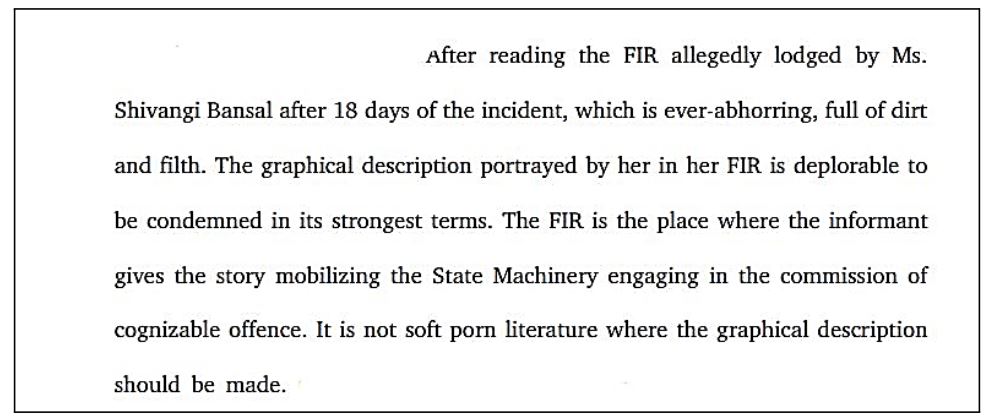
The court observed that the “language of FIR should be a decent one and no amount of atrocities would justify her to use such type of castic expressions.” The court further noted that the wife was unable to substantiate the allegations. The High court observed that the judgement of the session court was well short of standards enumerated in the Kahkashan Kausar @ Sonam vs. State of Bihar and Sajjan Kumar vs. Central Bureau of Investigation.
The High Court also commented on the misuse of 498A, which if continued would completely evaporate the traditional fragrance of our age-old institution like marriage. It relied on the observations made in the Social Action Forum for Manav Adhikar and another vs. Union of India, to propose some safeguards against the misuse of section 498A of the IPC. The following are some of the important safeguards provided by the High Court.
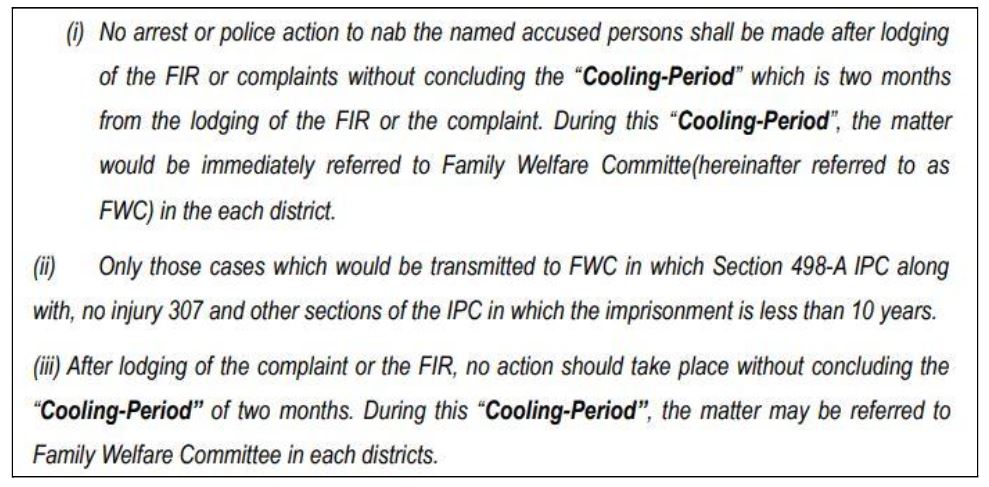
The Court again reiterated that no arrest or coercive action should be taken on the petitioners without exhausting the ‘cooling period’.
Calcutta High Court: No Illegality, upholding the State Govt’s doorstep Ration Delivery Scheme
The Calcutta High Court, in Sk.Manowar Ali & Ors. vs. The State of West Bengal & Ors. upheld the state government’s doorstep ration delivery scheme and held that the conditions for repugnancy are not satisfied to hold any inconsistencies between the state and central laws.
The High Court was hearing a plea challenging West Bengal’s Duare Ration Scheme, which made amendments to West Bengal Public Distribution System (Maintenance and Control) Order, 2013. The petitioners claim that this amendment is unconstitutional and ultra-vires to the National Food Security Act, 2013 and the Essential Commodities Act, 1955. The petitioner argued that all the aspects relating to the essential commodities like the production, distribution and supply are authorized by the Union Government and unless it delegates such authority to the State Government, the State Governments have no authority. In this case, there was no such delegation of power.
The respondent through their counsel argued that the above scheme is an administrative decision under section 12(1) of the NFSA 2013, and Article 162 of the Indian Constitution. The counsel further contended that it is the responsibility of the state to ensure actual implementation and monitoring of the central government schemes and reading Section 12 (1), 24 (1), 24 (2)(b) and 24(3) of NFSA, 2013 provide the scope for the state governments to undertake initiatives to achieve this stated objective.
The counsel submitted the conditions to be satisfied for any repugnancy between the state and central laws.
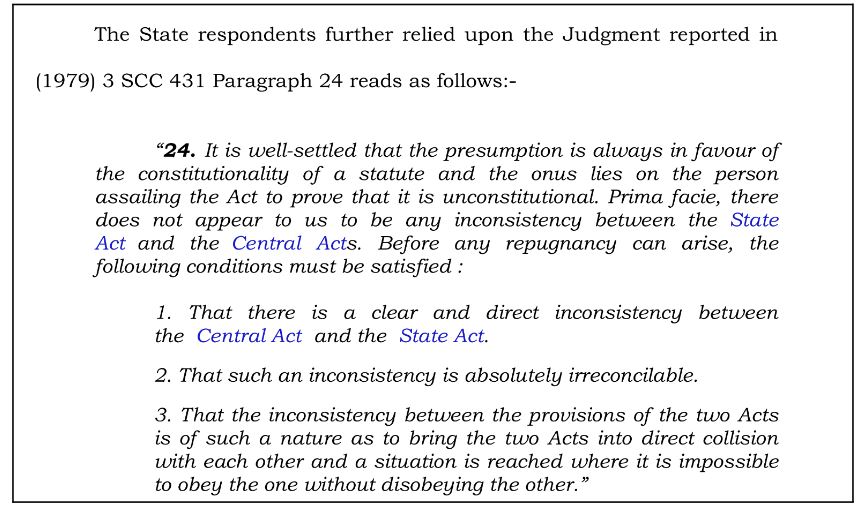
The respondent contended that no such condition is satisfied. Upon hearing the arguments, the court held that section 24(2) of the NFSA Act obliges the state governments to ensure adequate implementation of the scheme and any such initiatives taken to ensure this does not fall foul of any provisions of NFSA. It also held that no conditions for holding the repugnancy between state and central acts are satisfied in this case. Accordingly, the petitions are dismissed, and the scheme is deemed constitutionally valid.
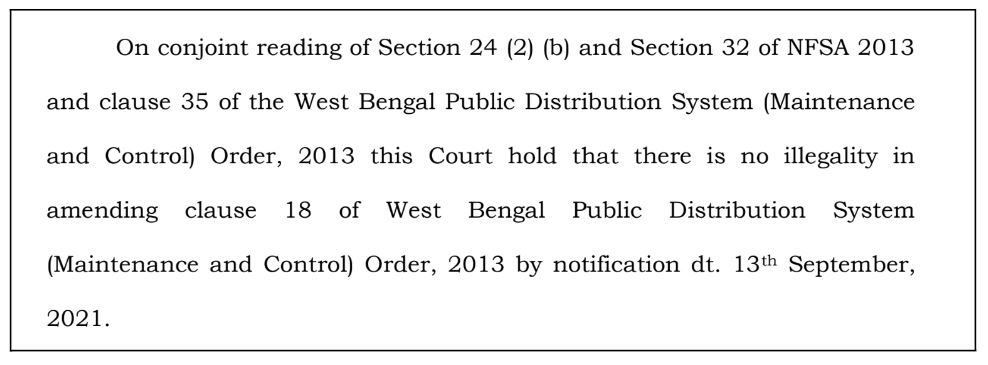
Featured Image: Important Court Judgements


